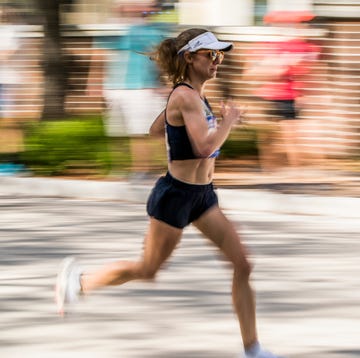We all have our own reasons for why we put in our miles. Running helps us cope with our personal woes. It keeps our hearts, minds, and bodies strong and healthy. It allows us to challenge ourselves, gives our days purpose, and connects us with the larger running community.
These motivations push us through workouts and finish lines, whether they are 5Ks or ultramarathons. But do the reasons pushing us differ depending on which distances we run?
Researchers from Poland sought to answer just that—and it turns out, there are some pretty obvious differences.
In the study, which was recently published in Psychology Research and Behavior Management, researchers asked 1,539 volunteer Polish runners to complete an online questionnaire about their motivations to run.
They divided the motivations into four categories: psychological (life meaning, self-esteem), achievement (personal goal achievement, competition), social (affiliation, recognition), and physical (health orientation, weight concern). The participants rated the importance of each motivation on a seven-point scale.
Then, they separated the participants into two groups: ultrarunners—those who raced longer than 50K distances—and runners who competed in shorter distances.
The researchers noticed a significant difference: Shorter-distance runners rated psychological coping, self-esteem, competition, health, and weight concern as larger motivators than their ultrarunner colleagues. The ultrarunning group was driven more by qualitative motivations, like life meaning and affiliation.
“For ultrarunners, personal records, traveling, and racing with friends is more valuable than competing with other athletes,” lead study author lead author Zbigniew Waśkiewicz, Ph.D., told Runner’s World.
Finding a like-minded group also feeds their need for affiliation, too.
“The sense of belonging to a specific society—and we all know that ultra-runners are absolutely specific—gives you the feeling of being original and extraordinary,” Waśkiewicz said. And when you practice and compete in a group, it helps impart the power to overcome obstacles that would be impossible to conquer individually, too.
The researchers also analyzed how the number of races a runner competed affected their motivation. They found that the more races a runner completed—whether they raced in ultras or in shorter distances—the less motivated they were by personal goal achievement. (That doesn’t mean they didn’t strive for certain goals or finishes, but that they rated other factors as stronger drivers).
Looking specifically at the ultrarunners, the more ultramarathons they finished, the less driven they were by external factors like competition and recognition.
Waśkiewicz believes this speaks to the experience of ultrarunning versus traditional running: While most runners can fit training and racing into their weekly schedules without too much difficulty, ultrarunning requires a total commitment to logging many, many miles a day—on top of work and other commitments—while also fueling, sleeping, resting, and Marathon Workouts to Get Faster.
“Ultrarunning is a specific style of living and competition. There is no place for temporary preparations just for one race, such as a half-marathon or even a marathon,” Waśkiewicz said. “If you want to perform well in ultra-running events, you have to dedicate to specific style of living and continue it for many years.”
When your whole life is centered around ultrarunning, the competition doesn’t stop at the finish line, but is ongoing, every day. In the end, the ultramarathon is a test of the runner’s own mental and physical endurance—it’s not about who can beat who, Waśkiewicz said. And as far as recognition goes, ultrarunning is still a relatively niche sport, and few outside of the running community know the names of elite ultrarunners. So it makes sense that ultra athletes aren’t in it for the fame.
The change in motivation also may have to do, in part, to the age differences in both groups: The ultrarunners tended to be older than the traditional-distance runners.
Younger runners naturally “seek more competitive races to test their abilities and limits,” while older athletes “try to develop their own plans and philosophy of performance independent from external conditions [such as winning awards],” Waśkiewicz explained.
Plus, it also has to do with the transition to running ultras, too. Most ultrarunners don’t dive right into races beyond marathon distances; rather, they train first for half and full marathons, then work into the distance over time. During this transition into ultrarunning, perhaps running became not a means to an end (weight loss, higher self esteem, race awards) for this group, but an end in and of itself: an activity that provided their lives with purpose and a community in which they thrived.
“When you have trained for 20 years and participated in 40 or more marathons, you seek something different in running,” Waśkiewicz said. “For ultra-runners, living happily and being directed and motivated by valued life goals are more important than sport successes and temporary happiness.”

Hailey first got hooked on running news as an intern with Running Times, Nutrition - Weight Loss Runner's World and Bicycling magazines.













